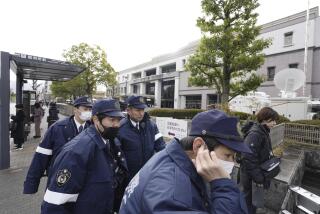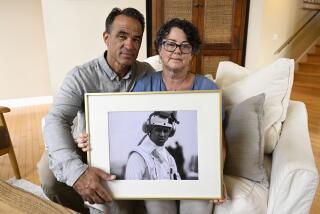Japan hangs three prisoners, first executed under new government
Japan hanged three convicted killers, its Justice Ministry said Thursday. The hangings are the first executions under the new government, continuing a secretive practice that has appalled human rights groups and made Japan an outlier among wealthy democracies.
The three inmates were identified in Japanese media as Masahiro Kanagawa, convicted in a string of stabbings five years ago; Keiki Kano, sentenced for murdering a bar owner; and Kaoru Kobayashi, convicted of abducting and killing a 7-year-old girl.
“All of these cases were extremely brutal; the precious lives of the victims were robbed for very selfish reasons,” Justice Minister Sadakazu Tanigaki told reporters Thursday after the executions, the Japan Times reported. Tanigaki said the courts had thoroughly considered the cases. “I decided to order the executions after carefully going over all of the various aspects.”
Executions in Japan are carried out under a shroud of secrecy. Until about five years ago, Japan did not even reveal the names of the executed. Prisoners are given only a few hours’ notice that they will be put to death. Their families find out afterward.
Hangings are closed to inmates’ and victims’ families, the media and the public, and even glimpses of the execution chambers are rare. When Japanese lawmakers successfully petitioned to visit the Tokyo gallows a decade ago, it was the first time any outsider had seen them since 1973, according to activists.
In some ways, the Japanese criminal justice system “gives the impression of an authoritarian system, not a democratic one,” said David T. Johnson, a sociology professor at the University of Hawaii at Manoa. “And executions may be the ugliest part of the whole lot.”
What little is known about life on Japan’s death row comes largely from the few prisoners who have been freed. Former inmate Masao Akahori, who was retried and released after 31 years on death row, told The Times he was so traumatized after his ordeal that for years, he could not speak.
The prisoners “were not allowed to communicate, but we would knock on the walls at the back of the cell to make sure the other guy was OK,” Akahori told The Times seven years ago. Once, he said, guards came to fetch him for execution, only to realize that they had gone to the wrong cell.
Death penalty opponents say that the secrecy is engineered to avoid the candlelight vigils and media attention that surround disputed cases in the United States and elsewhere. Government officials have told reporters that the system is meant to ensure privacy and soothe the prisoners awaiting death.
“According to the government, a blanket of isolation and quiet must cover death row to assist those who are to be executed in coming to terms with their inevitable fate,” Washington Post opinion writer Charles Lane wrote, reflecting on his studies on the Japanese death penalty in 2003 and 2004. “Any other policy, I was told, would result in psychological damage.”
Japan’s Supreme Court has found execution to be extreme but not “cruel,” which would violate the constitution. Government polls have continued to show overwhelming support for the death penalty, despite the continued objections of local and international human rights groups and the Japan Federation of Bar Associations.
There are now 134 inmates on death row in Japan, one of the highest levels in decades, according to Amnesty International. Executions declined while the more liberal Democratic Party of Japan was in power, with no prisoners put to death in 2011. Human rights activists worry that executions could accelerate again under new Prime Minister Shinzo Abe, whose government oversaw an unusually high number of hangings during his last term.
“The fear is that this marks the beginning of a new wave of coldblooded killing by the State,” Roseann Rife of Amnesty International said in a statement Thursday.
There have already been signs of change: The Justice Ministry recently discontinued its study groups examining the death penalty, Johnson said. Reaction to the latest hangings seems muted. Abe and his Liberal Democratic Party appear to be returning to the same practices as before.
“They’re kind of going back to the future,” Johnson said.
About two-thirds of countries do not use the death penalty, according to Amnesty International. Japan and the U.S. are unusual among wealthy democracies in imposing the punishment.
ALSO:
Report rebukes Mexico over cases of the missing
Twin bombings kill at least 11 in southern Indian city
Police commissioner replaces investigator in Oscar Pistorius case
More to Read
Start your day right
Sign up for Essential California for news, features and recommendations from the L.A. Times and beyond in your inbox six days a week.
You may occasionally receive promotional content from the Los Angeles Times.






